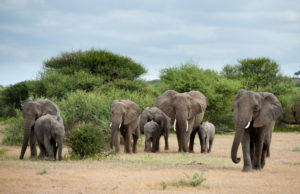
Elephants on an African Reserve (Photo via safaribookings.com)
Nakuru — Since the 1970s, poaching has been a major threat to the survival of elephants in Kenya, with some critics in recent years blaming the Chinese market for fueling the demand.
Now, a new era has begun as the Chinese government announced on Dec. 30 its plans to proscribe processing and sale of ivory by the end of 2017.
Jabes Okumu, a wildlife expert with the East African Wild Life Society, in an interview with Xinhua, hailed it as a strong move towards protection of elephants.
Okumu said the decision to shut down China’s domestic market will to a greater extent reduce pressure on the wildlife resources not only in Kenya but also in East Africa. The wildlife expert said the ban will lead to crippling prices as a result of limited buyers of raw ivory, as well as a decline in supply resulting from a lower number of distributors.
“This move is likely to attract support from other ivory-consuming countries and this will help build synergies towards pushing for full protection of elephants as indicated in schedule II to I of the CITES,” he said.
CITES, or Convention on International Trade in Endangered Species of Wild Fauna and Flora, is an international agreement between governments aiming to ensure that global trade in specimens of wild animals and plants do not threaten their survival.
Conservationists have identified a number of threats to African elephants, including poaching and habitat losses due to climate change, drought and human encroachment.
Read more here.


